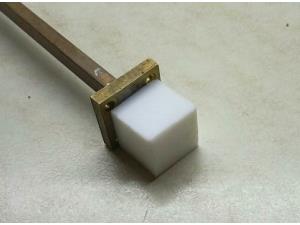



Date:09/08/19
 Scientists say that as well as technological simplicity and huge capabilities, the antenna benefits from being relatively small while its closed antenna output will help protect it from the rain, dust and wind.
Scientists say that as well as technological simplicity and huge capabilities, the antenna benefits from being relatively small while its closed antenna output will help protect it from the rain, dust and wind.
A team of Russian and Japanese scientists has developed a sophisticated antenna for the 5G network, which will help increase the speed of Internet data transfer, according to the IEEE Xplore Digital Library website.
To create the mesoscale dielectric cuboid antenna (DCA), researchers from Russia’s Tomsk Polytechnic University (TPU) and Tomsk State University (TSU) jointly with their colleagues at Gifu University in Japan used mesoscale dielectric particles ranging in size from one to ten wavelengths of incident radiation.
Igor Minin, professor at TPU Electronic Engineering department, said that in the process of work on photonics, the scientists managed to discover a mechanism of wave front formation inside a dielectric particle.
“This allowed us to float the idea of using a similar approach to form both near-field and far-field zones, namely, using mesoscale dielectric particles as an analogue of the DCA,” he added.
The DCA boasts technological reliability but also benefits from being relatively small (between 1 and 5 mm) and from the absence of open parts at the DCA output, which protects it from rain, dust and wind.
Previously, antennas were protected from the elements by special screens or inserts, which reduced the antennas’ operating ability.
The DCAs have no metal parts and are capable of operating near high-voltage wires and electricity, which ensures reliable electromagnetic compatibility.
According to scientists, their team now plans to focus on studying signal transmission for the communication systems in the 100 to 300 GHz range.
5G is the fifth generation of mobile communication with higher speed, bandwidth and the ability to connect with a lot more sensors and smart devices simultaneously. In Russia, the first 5G commercial network is scheduled to be launched by 2020.
Russian, Japanese scientists create sophisticated antenna for 5G network
 Scientists say that as well as technological simplicity and huge capabilities, the antenna benefits from being relatively small while its closed antenna output will help protect it from the rain, dust and wind.
Scientists say that as well as technological simplicity and huge capabilities, the antenna benefits from being relatively small while its closed antenna output will help protect it from the rain, dust and wind.A team of Russian and Japanese scientists has developed a sophisticated antenna for the 5G network, which will help increase the speed of Internet data transfer, according to the IEEE Xplore Digital Library website.
To create the mesoscale dielectric cuboid antenna (DCA), researchers from Russia’s Tomsk Polytechnic University (TPU) and Tomsk State University (TSU) jointly with their colleagues at Gifu University in Japan used mesoscale dielectric particles ranging in size from one to ten wavelengths of incident radiation.
Igor Minin, professor at TPU Electronic Engineering department, said that in the process of work on photonics, the scientists managed to discover a mechanism of wave front formation inside a dielectric particle.
“This allowed us to float the idea of using a similar approach to form both near-field and far-field zones, namely, using mesoscale dielectric particles as an analogue of the DCA,” he added.
The DCA boasts technological reliability but also benefits from being relatively small (between 1 and 5 mm) and from the absence of open parts at the DCA output, which protects it from rain, dust and wind.
Previously, antennas were protected from the elements by special screens or inserts, which reduced the antennas’ operating ability.
The DCAs have no metal parts and are capable of operating near high-voltage wires and electricity, which ensures reliable electromagnetic compatibility.
According to scientists, their team now plans to focus on studying signal transmission for the communication systems in the 100 to 300 GHz range.
5G is the fifth generation of mobile communication with higher speed, bandwidth and the ability to connect with a lot more sensors and smart devices simultaneously. In Russia, the first 5G commercial network is scheduled to be launched by 2020.
Views: 501
©ictnews.az. All rights reserved.Similar news
- Azerbaijani project to monitor disease via mobile phones
- Innovative educational system to be improved under presidential decree
- NTRC prolongs license of two TV and radio organizations for 6 years
- Azerbaijan establishes e-registry for medicines
- Azerbaijani museum introduces e-guide
- Nar Mobile opens “Nar Dunyasi” sales and service center in Siyazan city
- International conference on custom electronic services held in Baku
- OIC secretary general to attend COMSTECH meeting in Baku
- Azerbaijan develops earthquake warning system
- New law to regulate transition to digital broadcasting in Azerbaijan
- Azerbaijani State Social Protection Fund introduces electronic digital signature
- Intellectual traffic management system in Baku to be commissioned in December
- Tax Ministry of Azerbaijan started receiving video-addresses
- World Bank recommends Azerbaijan to speed up e-service introduction in real estate
- Azerbaijan to shift to electronic registration of real estate





















